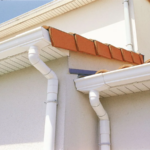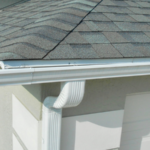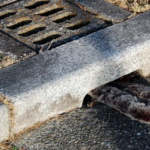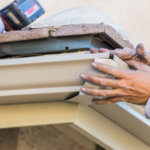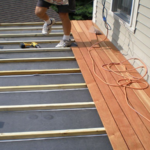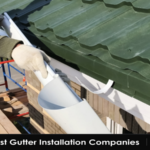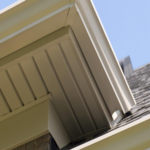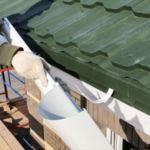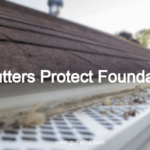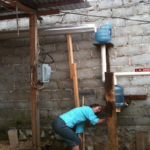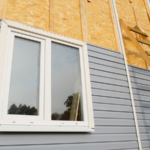When it comes to your home, protecting your investment should be a top priority. That’s why it’s so important to install gutters. Gutters play a vital role in keeping your home in good condition by channeling water away from your roof and foundation.
If you live in an area with a lot of rainfall, then you know how important it is to have gutters that work properly. Clogged or damaged gutters can lead to a number of problems, including water damage to your home’s exterior and foundation.
Gutters are available in a variety of materials, including aluminum, vinyl, and steel. There are also a variety of different styles to choose from. Seamless gutters are a popular choice because they’re less likely to leak than traditional gutters.
When it comes to installation, there are a few options. You can hire a professional to install your gutters, or you can do it yourself. If you’re handy and have some experience with home improvement projects, then installing gutters yourself is a relatively easy task.
Installing gutters is a great way to protect your home and your investment. By channeling water away from your roof and foundation, you can avoid costly repairs down the road.
Are gutters worth the investment?
There are a few things to consider when determining if gutters are worth the investment. The first is the climate. If you live in an area with a lot of rainfall, snow, or ice, gutters can help protect your home from water damage. They can also help keep your foundation from eroding. The second thing to consider is the type of home you have. If you have a home with a lot of trees nearby, gutters can help keep your home clean by preventing leaves and other debris from clogging your gutters and causing water to back up. The third thing to consider is the cost. Gutters vary in price depending on the size and material. However, the initial investment may be worth it in the long run if it prevents costly repairs down the line.
What are some common mistakes that people make when installing gutters?
- Not enough slope: If your gutters don’t have enough slope, water will pool in them and eventually overflow. To ensure proper drainage, make sure your gutters have a slope of at least ¼ inch for every 10 feet of run.
- Clogged downspouts: If your gutters are clean but your downspouts are still overflowing, chances are they’re clogged. Check to see if leaves or debris are blocking the flow of water and if so, clear them out.
- Incorrectly installed hangers: Gutters are only as strong as the hangers that hold them in place. If your hangers are loose or installed incorrectly, your gutters could pull away from your home and cause serious damage.
- Leaks: If you notice water leaking from your gutters, it could be a sign of a bigger problem. Check for cracks or holes in your gutters and have them repaired as soon as possible to avoid further damage.
- Poorly designed gutters: Gutters come in all shapes and sizes, but not all designs are created equal. If your gutters are poorly designed, they may not be able to handle the amount of water they’re supposed to and could fail prematurely.
Are gutters always a good idea?
Gutters are not always a good idea. They are a good idea when they are installed properly and when they are the right size for the roof. Gutters are not a good idea when they are installed improperly or when they are the wrong size for the roof.
What is the rule of thumb for gutters?
There is no definitive answer to this question as there are a number of factors to consider, including the type of roof, the climate, and the amount of leaves and debris that typically accumulate in the gutters. However, as a general rule of thumb, it is generally recommended that gutters be cleaned at least twice a year – once in the spring and once in the fall.
What is the disadvantage of not having gutters?
One of the disadvantages of not having gutters is that rainwater can pool around the foundation of your home, which can lead to flooding and water damage. Additionally, without gutters, rainwater can erode the soil around your home, which can eventually lead to cracks in your foundation. Not to mention, without gutters, leaves and other debris can accumulate on your roof, which can lead to clogged drains and an unsightly appearance.
Do gutters increase the value of a home?
There is no one-size-fits-all answer to this question, as the value that gutters may add to a home depends on a number of factors, including the type of gutters installed, the condition of the gutters, the climate in which the home is located, and the overall condition of the home. However, in general, gutters can help to increase the value of a home by protecting the home from water damage, extending the life of the home’s roof, and improving the home’s curb appeal.
Do gutter guards increase the value of your home?
If you’re looking to increase the value of your home, gutter guards are not going to be the deciding factor. While they may help to keep your gutters clean and free from leaves and debris, they won’t do much to raise the actual value of the property. There are other home improvement projects that will have a much more significant impact on the appraised value of your home. So, if you’re looking to increase the value of your home, gutter guards are not the best way to go about it.
What are the pros and cons of having gutters?
There are a few pros and cons of having gutters. One pro is that gutters can help to protect your home from water damage. Water can pool around the base of your home and seep into your foundation, causing serious damage. Gutters can also help to prevent staining or paint damage on the exterior of your home. Another pro is that gutters can help to keep your landscaping looking nice by directing water away from delicate plants and flowers.
A couple of potential cons of having gutters are that they can be a bit of a pain to keep clean and free of leaves and other debris. If you don’t clean your gutters regularly, they can start to sag and pull away from your home, which can be a costly repair. Gutters can also be a bit of an eyesore, especially if they’re not well-maintained.
Final Talk
If you have a home, it’s important to protect your investment by ensuring that your gutters are properly installed and maintained. This guide provides everything you need to know about gutters, from installation to care and maintenance. By following these tips, you can keep your home in top condition and avoid costly repairs down the road.

